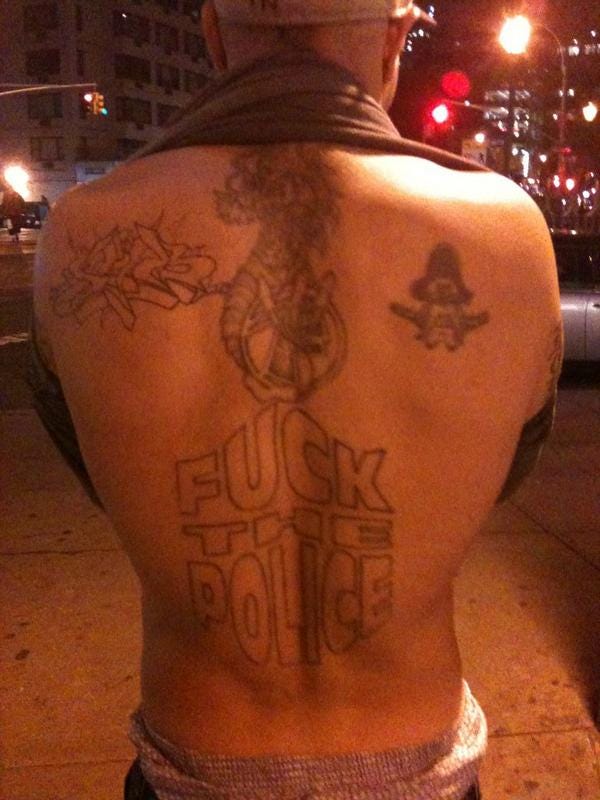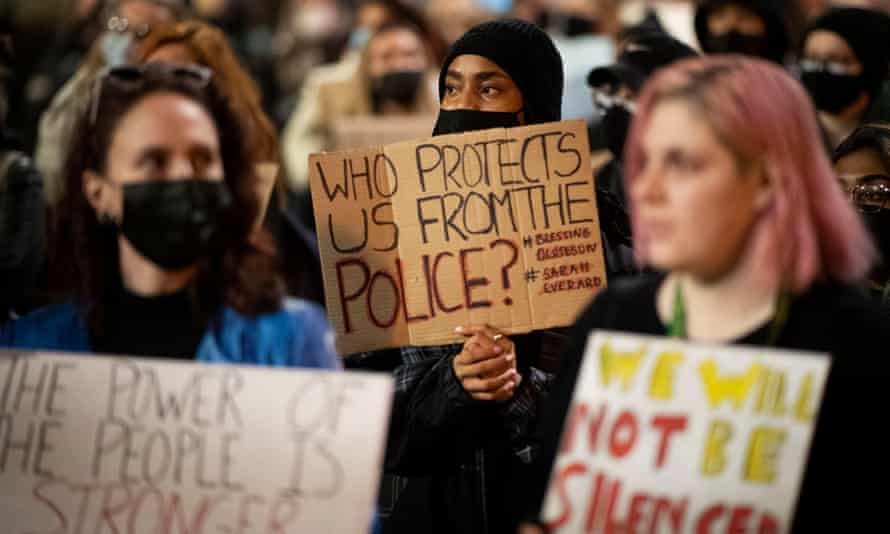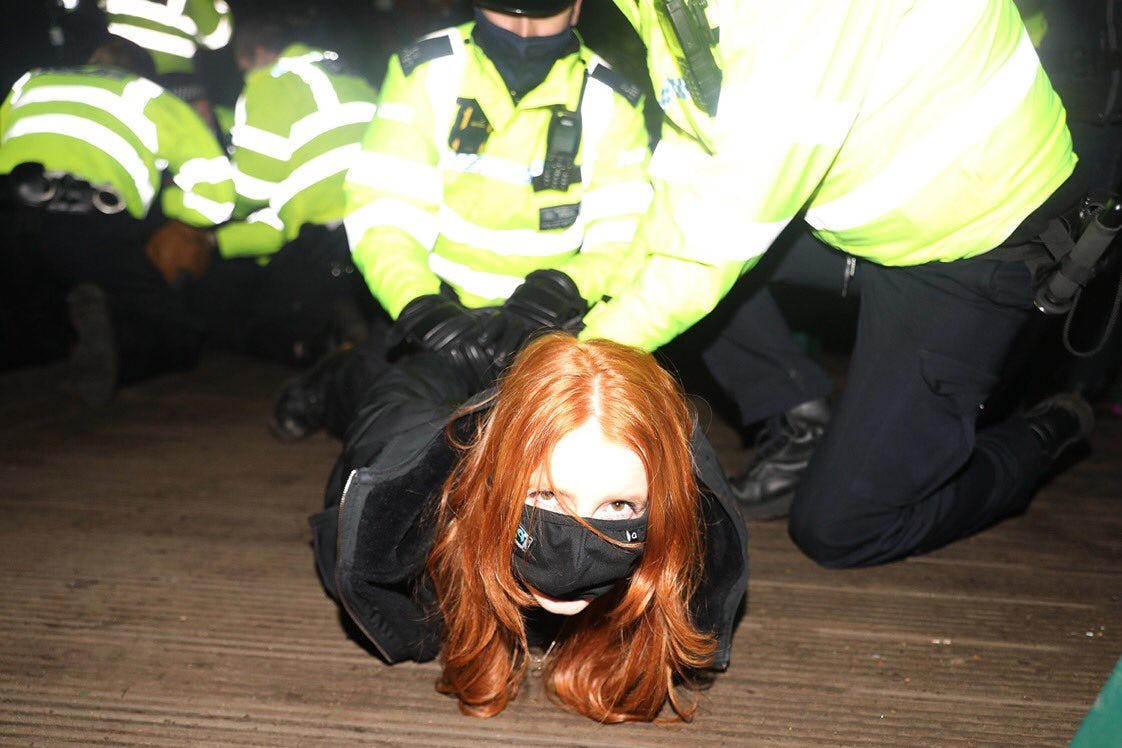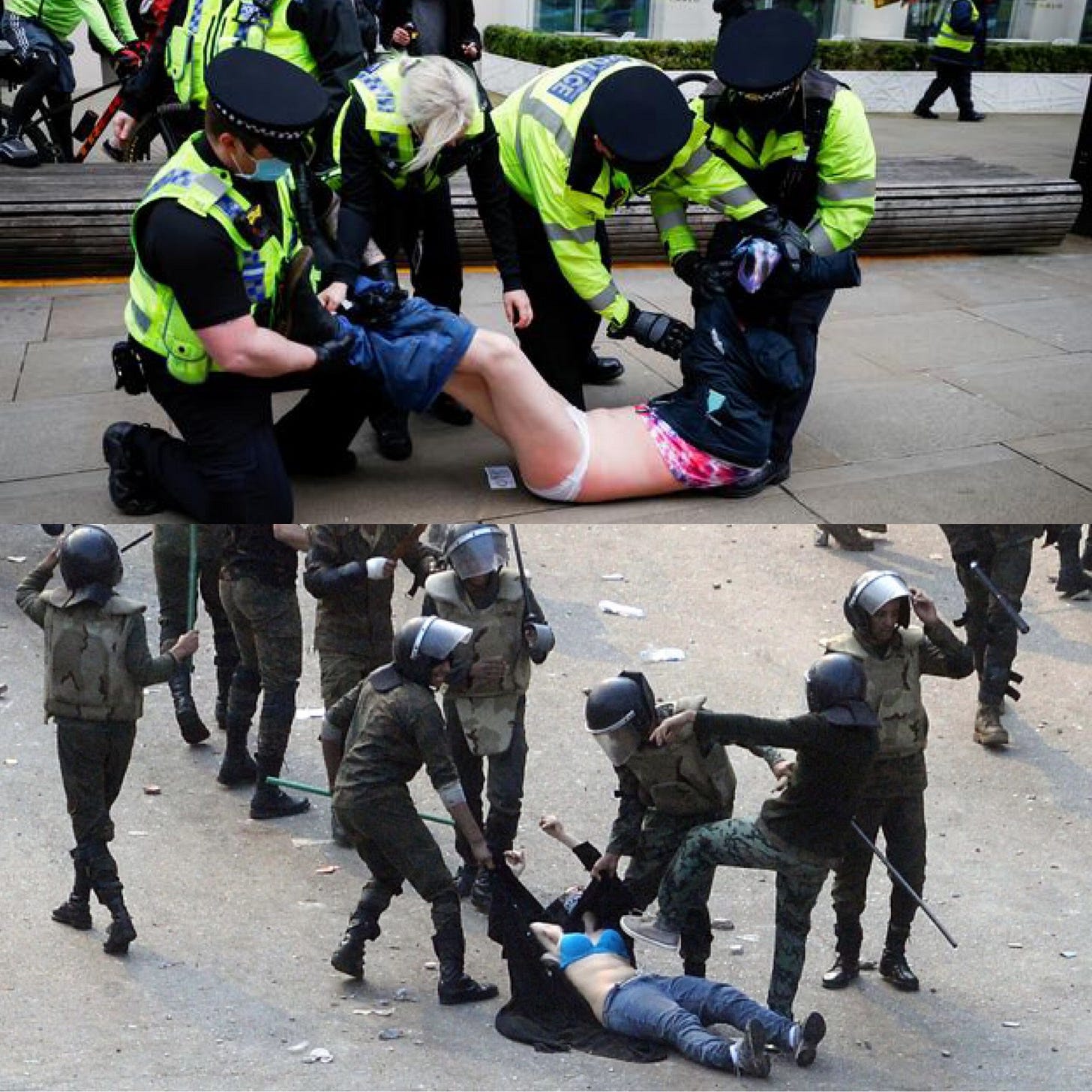Essay: Fuck the Police
Who Protects Us From the Police?
Photo: Protester outside the National Assembly, Mexico City, March 2021, Cuartoscuro
tw: sexual violence, police brutality
Fuck the police.
Two days after Egyptian riot police broke my left arm and right hand and sexually assaulted me during a protest near Tahrir Square in November 2011, I had to fly back to New York City, where I lived at the time. Having both arms in a cast from wrist to shoulder made it impossible to do just about everything, and especially so while traveling.
Back home in NYC, and awaiting surgery to realign the bone in my left arm and secure it with a titanium plate, I was out one evening when a Latinx man pointed to my arms and asked me what happened. I was conspicuous and I knew people were curious - how often do you see people with both arms in plaster of Paris casts? So I explained to him what police in Cairo had done to me.
As soon as I finished, he turned around and lifted his shirt to show me a tattoo that said “Fuck the police” written across the entirety of his back. He got the ink, he explained, after he had been brutalized by the NYPD. I was so moved by our shared experience that I asked him if I could take a picture of his back.
Invariably, when a Black or person of colour asked me what had happened to me, their response to my explanation was similar to that man’s: they would share their own or a relative’s experience of police brutality. It was especially moving when the physician’s assistant who worked with my primary care doctor described to me how the police had brutalized her brother as she was helping prepare me for a cardiogram and other tests I had to do before my surgery.
Who protects us from the police?
As protests once again spread across U.S. cities after the police murders of Daunte Wright and Adam Toledo, even as the trial of the white police officer who murdered George Floyd last year continues, and especially as calls to defund and abolish the police continue, as they must do, to offer the most salient solution to the savagery of a uniformed gang of thugs armed and permitted to hurt us, that question is an incessant drum on our collective conscience: who protects us from the police?
My feminism has led me to anarchism. In “Rethinking Anarchy,” the Spanish social theorist Carlos Taibo reminds us that “anarchists have frequently defined themselves first on the basis of what they reject — the state, capitalism, inequality, patriarchal society, war, militarism, repression in all its forms, authority.” Central to that is abolishing what Black feminist organizer and abolitionist Mariame Kaba calls the Prison Industrial Complex--police, prisons, military--as agents and enforcers of State violence. I have learned the most about abolishing the police from Kaba. And I have learned that the first thing you will be asked if you “abolish the police”, especially if you are a woman—and that is telling—is “But what about rapists?”
Who protects us from the police?
It is telling that police are thought to be our protectors from rapists and predators when they themselves are too often the rapists and predators.
Police have sexually assaulted me at pilgrimage (when I was 15 years old), at work while I was reporting on a trial in a courthouse (when I was in my 30s), and at protest near Tahrir Square (when I was 44 years old).
Boston Police hid from the public their own evidence in 1995 that one of their officers had sexually assaulted a 12-year-old child. He kept his badge, worked on child sexual assault cases, and became union president. He allegedly went on to molest five other children.
A former detective in Texas suspected of the massacre of his wife, daughter, 17, and an 18-year-old friend, on April 19 was arrested the next day. Last summer while still a cop, he was charged with sexually assaulting and assault by strangulation of his daughter when she was 16 years old.
A 2015 study in the U.S. found that, over a 10 year period, an officer was caught in a case of sexual misconduct every five days.
“Some officers coerce street-based sex workers into performing sexual acts to avoid arrest. Relying on law enforcement to respond to sexual violence ignores the reality that many cops are perpetrators of such violence,” Cassandra Mensah, a Black attorney who represents survivors of domestic violence in New York courts and who herself is a survivor of sexual violence, wrote in this article in which she unpacks the “What about rapists?” argument.
As recently as March, it was legal for federal law enforcement officers in the U.S. to rape people in their custody and claim it was consensual sex. You can’t consent to sex with someone who is armed and is detaining you! House lawmakers in March passed a bipartisan bill that would close a legal loophole that has allowed that fuckery. The bill applies only to federal law enforcement officers, not local or state police. On the state level in the U.S., it is still legal in 34 states for police to effectively rape someone in their custody and claim it was consensual.
In the U.K. in what it described as an “extraordinary catalogue of sexual misconduct allegations against Metropolitan police officers,” the Guardian reported that there were a total of 594 complaints against the police service for the Greater London area between 2012 and 2018, of which 119 were upheld. They included a rape victim who complained that the investigating officer “took advantage of her vulnerability and had sex with her on two occasions”. The officer was subsequently dismissed.
Another was a Met officer who was dismissed after allegedly pretending to be a woman online “to advance his sexual proclivities and also film a woman apparently having non-consensual sex with a male in a public park”.
A protest outside Cardiff police station in March over new laws against demonstrations. Photograph: Matthew Horwood/Getty Images via The Guardian
It is telling that police are thought to be our protectors from rapists and predators when they do very little to protect us from rapists and predators.
“Black women and women of color who experience gendered violence rarely report to police, because of the systemic misogyny and racism that leads to survivors not being believed or supported,” write 8 to Abolition organizers Leila Raven, Mon Mohpatrra, and Rachel Kuo in this explainer of the group’s eight-point campaign to move society toward abolishing police and prisons.
In the U.S., more than three-quarters of sexual assaults go unreported to the police. The second most cited reason that a survivor cites not reporting to police is they believed police would not do anything to help. A study funded by the National Institute of Justice found that only 18 percent of reported sexual assault cases lead to arrests.
Out of every 1,000 sexual assaults, only 230 are reported to the police, nine cases get referred to prosecutors, and five will result in a prison sentence, according to RAINN, the largest anti-sexual violence organization in the U.S.
“The police don't take care of me, my friends take care of me”
It is telling that police are thought to be our protectors from rapists and predators when that protection is conditional on who you are.
In northern India, researchers have found that lower-caste Dalit women are targeted for rape by upper caste men who usually escape justice, as survivors bow to pressure to drop their cases. The police often failed to record or investigate crimes when initially reported and were sometimes abusive or put pressure on survivors to drop cases, two rights groups Equality Now and the Swabhiman Society, found.
Police in white supremacist countries downplay the violence of white men.
Especially when it is directed against marginalized women such as indigenous women and sex workers. Robert Pickton, one of the most notorious serial killers in history, targeted mostly sex workers and Indigenous women, some dealing with addictions or mental health issues, in Downtown Eastside in Vancouver, Canada. He admitted to butchering 49 women and feeding them to pigs.
When mothers, fathers or other relatives would go to Vancouver police to report their loved one missing, they were dismissed. Police were criticized for not taking the cases seriously because many of the missing were sex workers or addicts.
The police don’t protect us from violence; the police are perpetrators of violence. I want to be free of violence.
And it is telling that police are thought to be our protectors when they are the ones murdering us.
The month of March began and ended with police murders of two women (that we know of), in England and in Mexico.
Sarah Everard was abducted and murdered by a (male) police officer in London as she walked home at the beginning of the month. And Victoria Esperanza Salazar, died after her neck was broken by the weight of a (female) police officer kneeling on her after her arrest in the resort town of Tulum at the end of the month.
Sarah Everard, 33, was a white marketing executive. Victoria Esperanza Salazar, 36, was a refugee from El Salvador who worked as a cleaner in hotels.
There is a hierarchy of protection: the further we are from wealthy, white, cisgender, heterosexual, able bodied men, the less likely we are to be protected. And there is a hierarchy of concern. Sarah’s name was in headlines in many parts of the world in a way that Victoria’s was not. The intense coverage of the former compared to the little or no coverage given Black and women of colour victims of violence was a reminder of who we are told we should care about and who the police are expected to protect.
And when police kettled and violently arrested women at a vigil for Sarah in London, it was especially shocking to many because both the murdered woman and some of the handcuffed were white--police are not expected to do that to white women. At least publicly.
Those images of the police brutalizing women at a vigil for a woman who was murdered by a police officer took place in a country where the Police and Crime Bill aims to give police more power. Soon after the vigil for Sarah, police again used violence against Kill the Bill protesters in several cities against those increased powers. In Manchester, they did this to a woman, which immediately brought to mind what soldiers did to a female protestor in Tahrir Square in Cairo in December 2011.
Pictures: Manchester, REUTERS/Phil Noble, Cairo REUTERS/Stringer
Remember how white women in pink pussy hats happily posed with police during the Women’s March in 2017?
When the police claim they “protect and serve,” always ask who are they protecting and who are they serving? And just as importantly: who aren’t they protecting or serving? White women expect protection from the police. White women expect the police to serve them. The police protect property and they serve the State, and by extension they serve power.
And remember that just because police officers look like us does not protect us from the racist and misogynist systems that undergird the police force: a female officer murdered Victoria in Mexico in an almost identical manner to the way a white officer murdered George Floyd in the U.S.
Sarah and Victoria were murdered by police exactly a year to the month after police murdered Breonna Taylor in her home in Louisville. So again: who aren’t the police protecting and who protects us from the police?
“The police don't take care of me, my friends take care of me,” chanted Mexican anarchist feminists on their way to the National Assembly in Mexico City to protest Victoria’s murder.
I have learned the most about abolishing the police--and prisons as well as the military--from Mariame Kaba, who herself always shares those she has learned the most from including Ruth Wilson Gilmore and Angela Davis, for example. Her new book is a vital handbook for the discipline of hope that she is known for.
Ground yourself in that discipline by asking yourself as you watch the police--in the U.S., U.K., or wherever--again brutalize people protesting police brutality:
- Who do you usually see police arresting?
- Who do you expect the police to protect?
- Why do you think the police will protect you?
The police don’t protect us from violence; the police are perpetrators of violence. Ask the non-cis, the non-white, the non-wealthy, and most broadly, the non-men. I do not want to be protected. I want to be free of violence.
Fuck the police.
Mona Eltahawy is a feminist author, commentator and disruptor of patriarchy. Her first book Headscarves and Hymens: Why the Middle East Needs a Sexual Revolution (2015) targeted patriarchy in the Middle East and North Africa and her second The Seven Necessary Sins For Women and Girls (2019) took her disruption worldwide. Her commentary has appeared in media around the world and she makes video essays and writes a newsletter as FEMINIST GIANT.
FEMINIST GIANT Newsletter will always be free because I want it to be accessible to all. If you choose a paid subscriptions - thank you! I appreciate your support - you are helping me keep the newsletter free and accessible to all. If you like this piece and you want to further support my writing, you can like/comment below, forward this article to others, get a paid subscription if you don’t already have one or send a gift subscription to someone else today.








